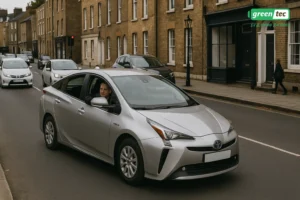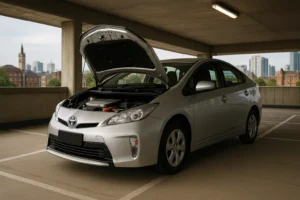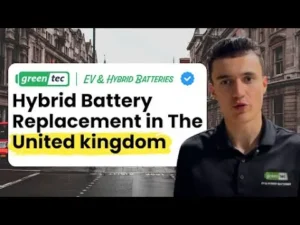A Greener Way Forward
Electric vehicles are often hailed as the future of clean transport—but what happens to their batteries when they’re no longer usable? In the UK, EV battery recycling is not just an environmental choice—it’s a regulated necessity. The process ensures the reduction of hazardous waste and the preservation of finite resources like lithium, cobalt, and nickel.
As EV adoption continues to grow, so does the volume of used batteries. According to the UK Department for Transport, EV sales surpassed half a million units in 2024 alone. By 2030, the number of end-of-life EV batteries is expected to grow significantly. Addressing this now ensures that future waste management systems remain effective and sustainable.
What the Law Says in the UK
Under the Waste Batteries and Accumulators Regulations 2009, producers and importers of electric vehicle batteries must ensure proper collection, treatment, and recycling. Consumers are also discouraged—and prohibited—from disposing of batteries in general household waste. EV batteries are considered hazardous waste due to their chemical makeup and potential for environmental harm.
Businesses must register with the Environment Agency and comply with strict handling, transport, and processing protocols. This ensures that all battery waste is properly accounted for and processed with minimal risk.
How EV Battery Recycling Works
At Greentec, we follow a carefully regulated multi-step recycling process:
- Collection and Logistics – Batteries are safely extracted from vehicles and stored in fireproof, regulated containers. Our technicians are trained in hazardous waste handling to comply with UK safety standards.
- Inspection and Sorting – Each battery is assessed for possible refurbishment. Viable modules are separated for second-life use, while the remaining cells are directed for recycling.
- Disassembly and Processing – Battery packs are manually dismantled, their components sorted by material, and processed into what’s known as “black mass”—a blend containing lithium, cobalt, manganese, and nickel.
- Recovery – Using hydrometallurgical techniques, we extract valuable elements from black mass and send them to battery manufacturers for reuse.
This process enables up to 95% material recovery, reducing the need for virgin mining and improving the circularity of the battery supply chain.
Why Battery Recycling Matters
- Prevents toxic chemical leakage into soil and water
- Reduces the environmental cost of mining and raw material extraction
- Supports the UK’s carbon neutrality goals and Net Zero 2050 ambitions
- Promotes job creation in the green economy sector
Without a sustainable recycling system, EVs risk replacing one environmental issue with another. Recycling ensures that the benefits of electrification don’t come at the cost of landfills and pollution.
The Circular Economy: Greentec’s Role
At Greentec, we take our role in the circular economy seriously. We don’t just dispose—we repurpose and regenerate. Our UK facilities are equipped to:
- Test and recondition usable battery cells for secondary applications
- Provide certified documentation for every recycled battery
- Track and trace every component that enters our system
We also collaborate with local councils, renewable energy companies, and educational institutions to further develop second-life applications for recovered batteries. Our goal is to ensure that no valuable material goes to waste.
Sustainable EV Batteries in the UK
Sustainability doesn’t stop at recycling. Greentec promotes the development and adoption of:
- Low-cobalt and cobalt-free batteries that are safer and easier to recycle
- Modular battery designs that are easier to disassemble and repair
- Eco-friendly packaging and shipping methods to reduce transport emissions
We believe battery design should consider not just performance, but end-of-life reuse. By supporting innovation in these areas, we help shape a future where sustainability is built in from the start.
What You Can Do as an EV Owner
You play a role too. Here’s how:
- Schedule a proper battery removal or trade-in when replacing your pack
- Choose repair or refurbishment over full replacement if viable
- Ask for a recycling certificate to ensure legal and responsible disposal
- Support companies and policies that prioritise battery lifecycle management
Educating friends, family, and local communities also increases awareness and demand for proper battery stewardship.
UK Government Support and Future Outlook
The UK government has introduced several policies and funding initiatives to encourage battery recycling and second-life use. Through organisations like Faraday Institution and UK Battery Industrialisation Centre (UKBIC), millions have been invested in scaling domestic battery processing capabilities.
As of 2025, the UK is expected to mandate battery passports—digital documents tracking a battery’s origin, usage, and recycling history. This will improve traceability and create more accountability across the industry.
Final Thoughts
Battery recycling isn’t just the final chapter, it’s the beginning of a sustainable cycle. By supporting ethical recycling practices, choosing the right partners, and staying informed, we can make EV adoption a full-circle win for the planet.
At Greentec, we’re committed to not only meeting recycling requirements but exceeding them—through education, innovation, and environmental leadership.
Book a battery disposal consultation today or visit our site to learn how we’re building a circular economy.




